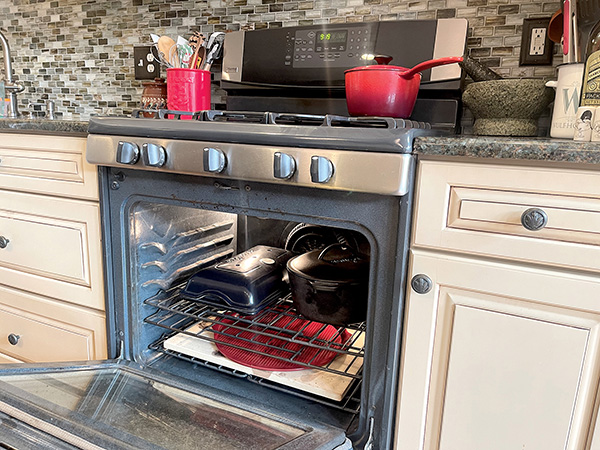
By Judy O’Gorman Alvarez
When Marirose Krall’s oven went kaput the Wednesday before Easter Sunday this year, she was a little stressed. “We were supposed to make the ham” for the family dinner she was attending as a guest.
She reluctantly boiled the ham – the gas burners still worked – and admitted “it was horrible.” But she never expected shopping for a new oven would be so difficult.
“There were limited choices – because the supply chain is a mess,” she said.
There was no consulting Consumer Reports or taking a poll of friends’ recent oven purchases. Krall’s options were to wait 12 weeks or longer for the oven she wanted or choose what was in stock.
In the 16 months since COVID-19 forced lockdowns in the Two River area and across the country, there’s been nary an industry that hasn’t been impacted. Like the proverbial butterfly that flaps its wings in the chaos theory, the coronavirus has affected all aspects of our world – financial, environmental, health and more.
Much further down on the list – far below the staggering death toll and illness, the shuttered businesses and lost revenue, the physical and mental strain – are the homeowners and the businesses servicing them who have dealt with headaches and problems never before seen.
“That’s all we’ve been hearing from designers – how long it takes” to receive deliveries: furniture, building materials, appliances and more, said Krall, an assistant editor for Design NJ magazine. “They’ve never been busier because people are working from home and seeing the things they want to do.” But executing orders is the challenge.
Maureen Strang, kitchen and bath manager at Monmouth Building Center in Shrewsbury, agrees. When the pandemic first struck and folks were working at home staring at their walls, the redecorating bug hit a lot of people and Strang said they were doing virtual consultations for kitchen and bathroom remodels.
“Appliances took a hit,” she said. “People weren’t seeing the appliances they ordered for three months after their kitchens were installed.”
“It was an education,” Strang said. Contrary to the way they usually handled renovations, because of delays in securing the items, she would tell customers: “Pick your appliances first!”
Elizabeth Wulfhorst, an avid baker and features editor at this newspaper, felt that panic when her oven died in the beginning of June. “I knew it was going. It’s over 15 years old and I could tell it was only a matter of time,” she said.
Knowing about the delays, she decided to be proactive. “I took the time and did my research and ordered a new stove the third week of April,” she said, “figuring even if I had to wait a couple months I’d be fine.” But the delivery date they gave her was in September, five months away. “I was holding my breath,” she said, hoping her old oven would make it. “It didn’t help.”
She said she’s now learning how to bake on the grill and in her toaster oven, noting that if you have to be without an oven, the summer months are preferable to the holidays.
“From the beginning everybody expected a doomsday,” Mike Belforti, owner of Better Housekeeping in Red Bank, said about the pandemic-related shortages. “We slowly noticed around June and July (2020) the uptick of people doing work on their home. Then it snowballed to other industries.” And there were outside forces, he said, like refrigerator manufacturers that couldn’t get foam from China, which caused a backlog.
“In my opinion, it was a perfect storm,” he said. “It was exceptional demand with no supply.”
In pre-pandemic times, Belforti could get a product within two weeks. “Now when I order certain products – especially high-end items – I can’t get them until early 2022.”

Gas dryers, because of a delay on the gas valves, are the hardest to come by.
Belforti and the team at Better Housekeeping are exceptionally proud of their reputation for good customer service, so they took some unusual steps, including taking in products that may be needed later on but were available now. “We had everything we don’t need which led to a lack of warehouse space,” he said. “Now I’m on my third warehouse.”
In addition, they are loaning appliances to customers. “We have over 20 refrigerators in people’s homes waiting for their back ordered ones,” he said. “We have 30-inch stoves in 60-inch spaces just to get a certificate of occupancy.” The customers have to move into their homes. “And they have to cook.”
“We’ve been in business for 83 years,” Belforti said, “and we’re built on customer service.”
But it’s not just appliances that are backlogged. Donna DiMarco, head of purchasing at Monmouth Building Center, said whereas the state’s stay-at-home orders made people pay attention to repairs and improvements they wanted to do in their homes, those orders essentially shuttered manufacturers and mills for a time. “They can’t work from home,” she said.
Added to that are the shipping delays – nationally and internationally. “For international imports, there was not enough workforce at the ports to unload” the goods, said DiMarco.
“It turns into a catch-22. You have a product but can’t get it here,” she said. She cites a news clip that showed 32 ships anchored off a U.S. port waiting to dock and unload.
As for customers, DiMarco said, “They started out understanding and trying to be patient. This was a whole new way for everyone. But when weeks turned into months,” customers started ordering whatever refrigerators, front doors and wood was readily available.
“Last year, we never slowed down during the pandemic,” Strang said about the business. But lengthy delays in deliveries and then price increases only added stress to the situation.
“Costs could raise 25 to 30 percent,” she said. “Everything went up – lumber, labor.”
Whereas customers may have been ready to renovate, “Many may not be able to afford it now. People will say, ‘We’re going to hold off this year.’ ”
“Needless to say, there have been many challenges,” she said.
For Declan Murphy, owner of Dovetail Contracting in Little Silver, the pandemic-related delays of building materials have proven challenging, but nothing compared to the lack of laborers.
According to Murphy, no one could have predicted a coronavirus would result in a dearth of workers who could help build, repair, restore and renovate homes and businesses. “It has been a nightmare,” he said.
Trying to find labor is a laborious job. “I’ve run four months of ads and had no calls,” he said. Fully qualified skilled carpenters, he said, are not looking for work.
“It’s the free money,” Murphy said, blaming the COVID-19 unemployment insurance relief many workers are taking advantage of and he says is unfair. “I can’t wait until September,” he said, when the relief is scheduled to run out and, he hopes, workers will return to the jobs.
Rising costs are also a worry to contend with. “Jobs that I priced in December have gone up 25 to 30 percent,” he said. And even when the materials he ordered finally arrive, “you’re not getting the complete order.”
“It’s highly frustrating and they’ll get to the point when they blame you,” Murphy said of customers. “But at the end of the day, you have to reassure the client: You will walk away with a nice finished product.”
The article originally appeared in the July 22 – 28, 2021 print edition of The Two River Times.














